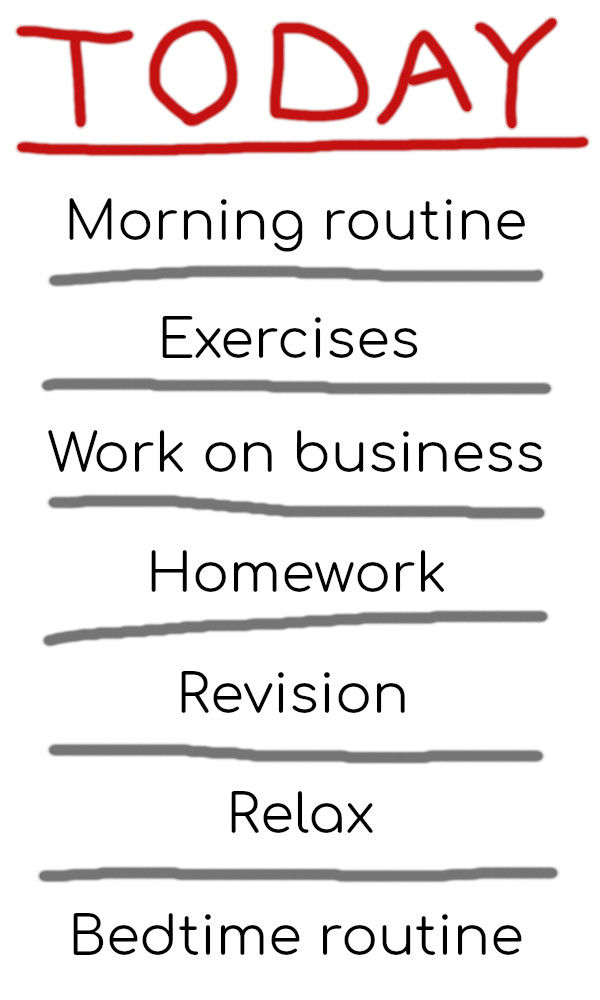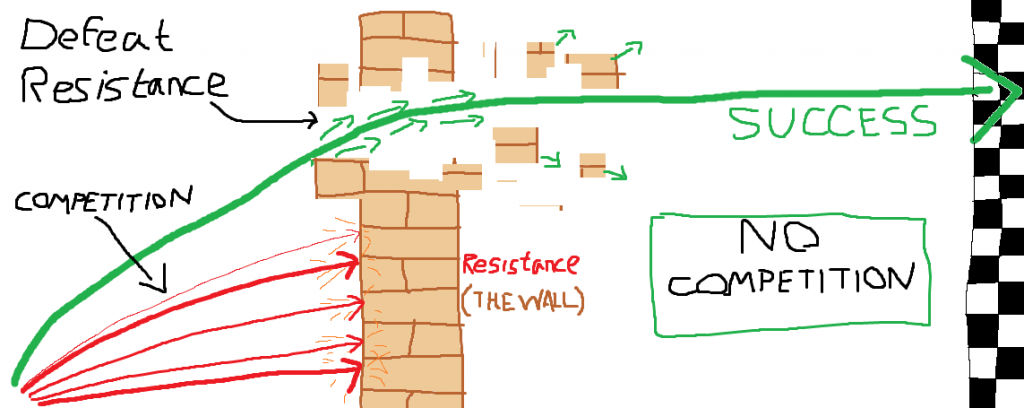Burnout is a mission-critical issue. However, luck has it that there are ways to prevent burnout before you succumb to your fatigue.
To clarify, it is the unfortunate result of overworking and excessively exerting barrels of willpower: the mental state whereby you are magically unable to be the most productive person you can be.
Therefore, you should manage your time wisely such that burnout is a mere non-issue.
insert_linkDealing with Study Burnout (Especially Before Exams)
As a student, burnout may be an ever more frightening problem for your mental health. Not to mention, your exam success.
So, you must take precautions to prevent burning out as a result of too much studying.
Of course, silently approaching you from the corner, exams put more and more pressure on you: your mental performance as well as your emotional management. After all, exam stress isn’t particularly uncommon.
Thanks to burnout, here’s the paradox: the more you study, the less able you are to study.
Never again burn out: Is It Possible for You to Be Productive All the Time? (Hint: Yes!)
insert_linkThe Causes of Burnout (It’s Not Just Excessive Amounts of Work)

Indeed, working excessively often results in burnout, but what exactly is “excessively”? In other words, where do we draw the boundary between excessive volumes of work and sustainable volumes of work?
If burnout was solely a product of work volume, then everyone would collapse with fatigue at the same point. Though, this is not the case.
To illustrate, there are people who would find fifteen minutes of work exhausting, whilst others could go significantly longer without ceasing.
With that in mind, here are other factors influencing when you reach the point of burnout:
- Work intensity (demand on your mental resources, that is to say)
- Work enjoyment and your commitment
- Your mental resources (like a bucket of willpower)
So, the point of burnout varies. And it can be changed by altering the factors contributing to it.
Because of this, the following ways to prevent burnout will help you increase your mental resilience and make you more committed to your work…
insert_link1. Ample Sleep is Paramount
Invariably, sleep comes in as the number-one way to prevent burnout, and it’s especially relevant to students.
Have you heard of the idea of staying up all night studying for an exam the subsequent day? Of course, you have!
But is it a good idea? That’s where things get spicy.
As a matter of fact, there are numerous things wrong with this strategy.
Firstly, staying up late in itself is going to make you tired, which already reduces study efficiency. Consequently, memorisation is likely to be less effective than you would like.
Secondly, the resulting sleep deprivation will apply the same disadvantages to your exam. Since your body hasn’t had sufficient time to commit your study material to memory, that revision now seems quite frivolous.
Not to mention the innumerable other effects of sleep deprivation, namely a lack of willpower and mental performance. Sure, even if you could memorise a tonne of facts the previous day, what is there to suggest you won’t be weary enough to misread a question or slow enough to leave the exam paper unfinished?
In many ways, sleep is the key to fighting fatigue in addition to preventing burnout.
insert_link2. Mindfulness Meditation

Alongside sleep in the general list of life hacks is mindfulness meditation. This is a way to train your mind to be aware of your thoughts, emotions, and experiences.
Even though the benefits are sufficiently bountiful for you to try it anyway, meditation is a fantastic way to avoid burnout due to school:
- Reduce panic, stress, anxiety, and depression
- Improve your focus, creativity, memory, and learning capacity
- Be able to make better decisions
- Become mentally stronger, more resilient, and more effective at dealing with pain
After having looked carefully at this list, you would have noticed that meditation gives you the foundation for effective burnout prevention. You learn more efficiently whilst studying as well!
Also, I found this interesting meditation headband for people serious about it.
For more info: 9 Self-Control and Discipline Strategies: Break Free Now!
insert_link3. Take Advantage of Physical Exercise
Furthermore, physical movement is an excellent way to promote mental recovery hence sustainable productivity. Occasionally, when I feel slightly fatigued, a good session of exercise gives me the energy to work hard.
Yep, exercise isn’t exclusively for weight loss and avoiding cardiovascular disease—it’s a key part of a happy, productive life; the secret to preventing burnout any day.
Evidently, scheduling prolonged periods of physical activity is necessary. Consequently, you have nice blocks of time away from your studies and the world of mental concentration.
Running is a tremendously good cardiovascular exercise, though, it’s advisable to do something you enjoy.
Moreover, smaller efforts to get moving are equally important—not surprisingly. In addition to large blocks of exercise, efforts to be moving throughout the day can be paramount in fighting burnout as a student.
For instance, after a study session, I recommend a short walk (around the house or in the garden, say). This engages your subconscious mind like a key to a treasure chest of gold.
Alternatively, you could do something such as push-ups or learning a new physical skill. Personally, I use my break time to practise doing handstands!
insert_link4. Take Deliberate Regular Breaks

Speaking of breaks, you can easily prevent burnout by allocating time to let your mind rest and recover.
To demonstrate, through the Pomodoro technique, I take a five-minute break for every 25 minutes of focused work. Moreover, this becomes a fifteen-minute break for every four 25-minute Pomodori completed.
As a result, you keep your mind fresh as well as motivated to work. After all, eight hours of non-stop studying are certain to burn your mind out.
Not to mention the sense of progress dedicated work sessions bring!
insert_link5. Change your Environment
Leading on from that, you’ll be surprised that the same view burns you out just as much as work. So, a way to prevent burnout and maintain productivity is to switch up your surroundings; it gives your senses a taste of variety.
If you’ve always studied at the same desk, try relocating midway through the day. Try the sofa—or perhaps the garden—for example.
However, this can be inconvenient. For this reason, I employ this tactic during my breaks from work:
- Walk around the house
- Go outside for a bit
- Surround yourself with (different) people
Nature is especially effective at promoting mental recovery, hence fighting burnout. You may not want to but go walking by the trees in the sprint up to exam season; you won’t regret it.
insert_link6. Plan to Fully Disengage and Enjoy Yourself

A wonderful time management strategy is to allocate time to not work but rest instead. During this resting period, you are fully disconnected from anything school- or work-related—free to think freely.
Ideally, you would spend your time enjoying yourself in order to contrast the mental effort of work.
Also, I recommend scheduling relax time at the end of the day, following all study activities. Not only does this act as a motivating reward, but it provides plenty of unbroken time for your mind to prepare for the next day’s work.
Although, please use this time properly, otherwise you’ll still be struggling with burnout. In other words, no addictive, meaningless, not-actually-fun activities—that includes social media!
By contrast, take up a productive hobby—something you’re passionate about—to deliver your daily enjoyment.
insert_link7. Leverage Variety
Coincidentally, this is the point in writing this article where I’ve stopped to pick it up the following day. As a result, I could move on to a different type of work activity.
…and now that it is the following day, I feel refreshed thus ready to crack out some spicy words!
It because of the variety.
If you spend so much time doing the same thing over and over, you’re going to get bored; you’re going to get burned out.
Therefore, those last-minute study marches scream unsustainability as you overwhelm yourself with schoolwork. Before you know it, you suffer from academic burnout and the inability to study effectively following that exam.
That being said, I don’t suggest working less (although breaks are important). Rather, aim to put variety into your productive work as a way to prevent burnout.
For example, as a student, you could study multiple types of subjects in a day alongside working on a business.
insert_link8. Use Systems and Routines to Reduce Friction
Systemise your life: the more clarity you have over what you’re supposed to be doing at any given point gives you the reason to plough onwards.
Firstly, identify actions you do routinely, then formalise them. To demonstrate, I have a morning routine, “begin work” routine, “shutdown” routine, as well as a bedtime routine.
Acting as convenient markers throughout the day, these help me compartmentalise and manage my time effectively.
Create clarity in your life: How to Organise Your Time at Home (with Compartmentalisation)

What’s more, the act of decomposition—breaking down your activities into smaller steps—makes work more digestible.
As a consequence, rather than feeling like you’re working on one huge, demanding task, it feels like many easy tasks!
insert_link9. Make Your Work Enjoyable and Purposeful
If you fail to find a reason to work, then you’re probably not going to work.
While this isn’t always easy or possible, there are ways you can enjoy your work a bit more to avoid burnout. Also, if it is truly worth your time, then your work should be meaningful and purposeful.
It is your job to find meaning in your work—schoolwork or otherwise: why are you doing this? What are the benefits of this work?
If your work isn’t as beneficial as it should be, stop doing it!
Additionally, you could find ways to take the enjoyment out of what was previously laborious. For instance, this could entail some form of reward.
But more effectively, you could employ some form of “fun” (or less painful) study technique; one point for every correctly answered flashcard—don’t break your streak!
insert_link10. Understand This One Important Fact
You may not like this one, though, it’s worth mentioning it:
You have to fight through burnout because the reward of pushing past it is infinitely worth it.
A good burnout recovery strategy, remembering the copious benefits of defeating your exhaustion. Not everyone fights through burnout, in fact, very few people do.
So, that in itself opens up the opportunity for you to blaze past the competition.
For you see, before the burnout, you may have been demotivated by the overwhelming competition—mediocrity. However, past that wall is a lone boundless desert of quite the opposite: few people made it past that wall.
If you can get past that wall, you will reap the benefits and achieve unimaginable success beyond just academia.
Have the intellectual advantage: My 3 Miracle Secrets to Absorb Knowledge (Super Quickly!)

insert_linkConclusion
These are ten ways to prevent burnout:
- Get plenty of sleep
- Meditate daily
- Physically exercise regularly
- Take regular breaks from work
- Plan time to fully disengage from work
- Change your environment often
- Vary your working day
- Leverage systems and routines
- Make your work enjoyable and meaningful
- Realise the benefits of overcoming burnout
Evidently, a lot of these tips lean on the concept of variety—an immensely critical factor in sustaining productivity. Strategic time management helps with this, too.
I recommend that you work to weave all ten of these techniques into your life, slowly but consistently. Definitely ensuring sustainable burnout prevention, work towards creating effective, beneficial habits.
insert_linkThis Week’s Book Recommendation
Suffering from student burnout? This is a well-known book geared towards helping you fight resistance facing your work:
The War of Art: Break Through the Blocks and Win Your Inner Creative Battles
Next, tell me about your experience with sustaining productivity in the comments:
Do you struggle with academic burnout?



